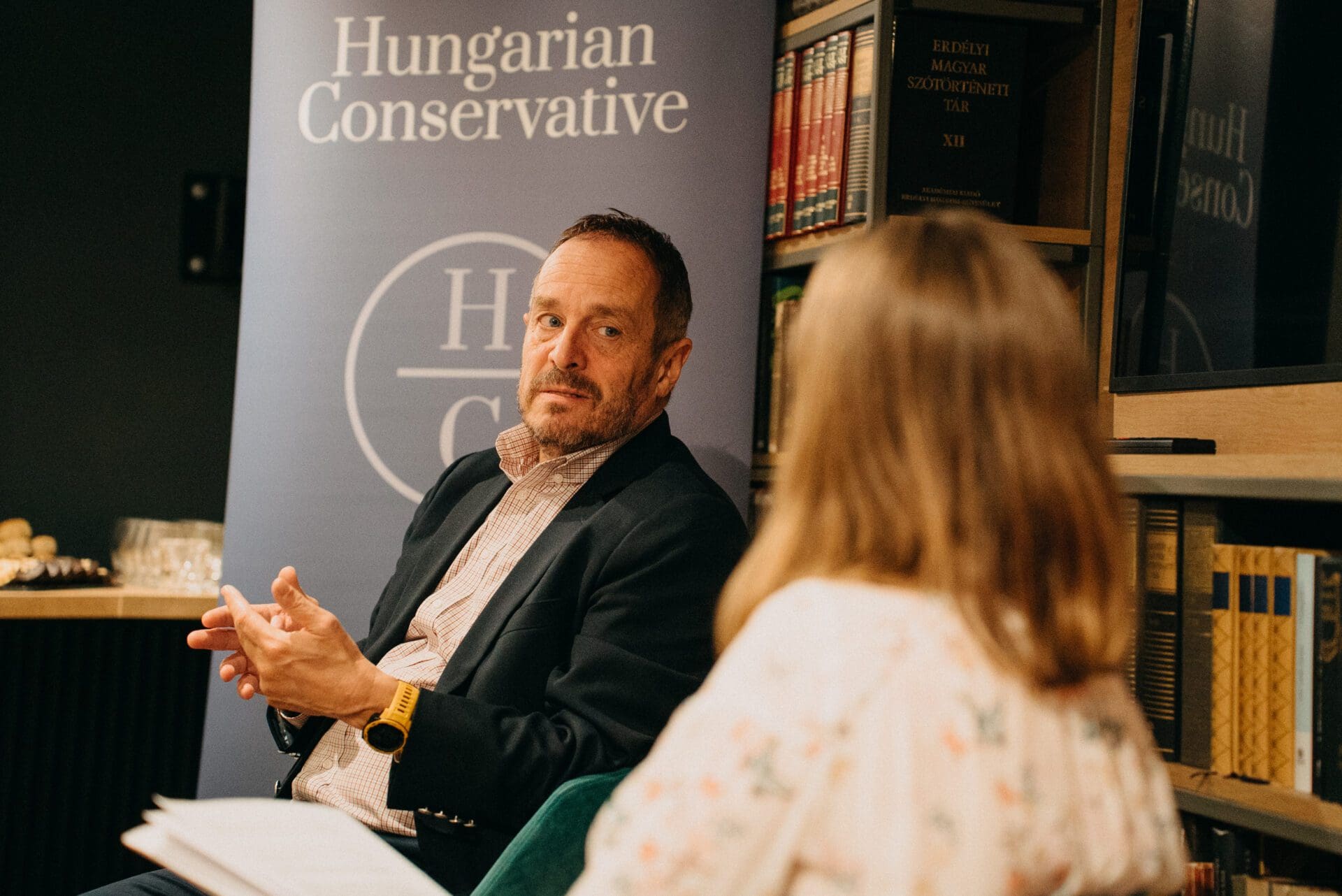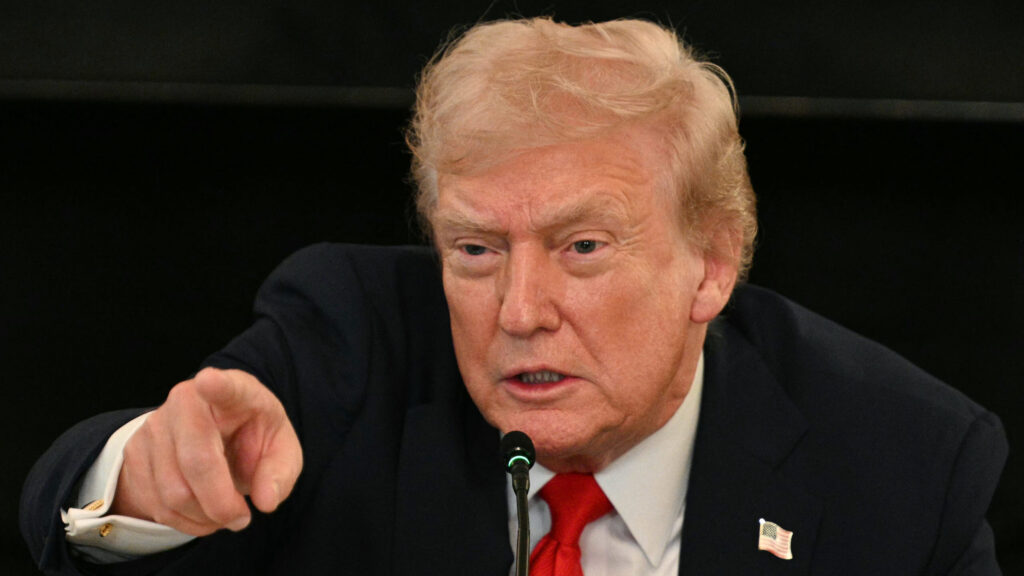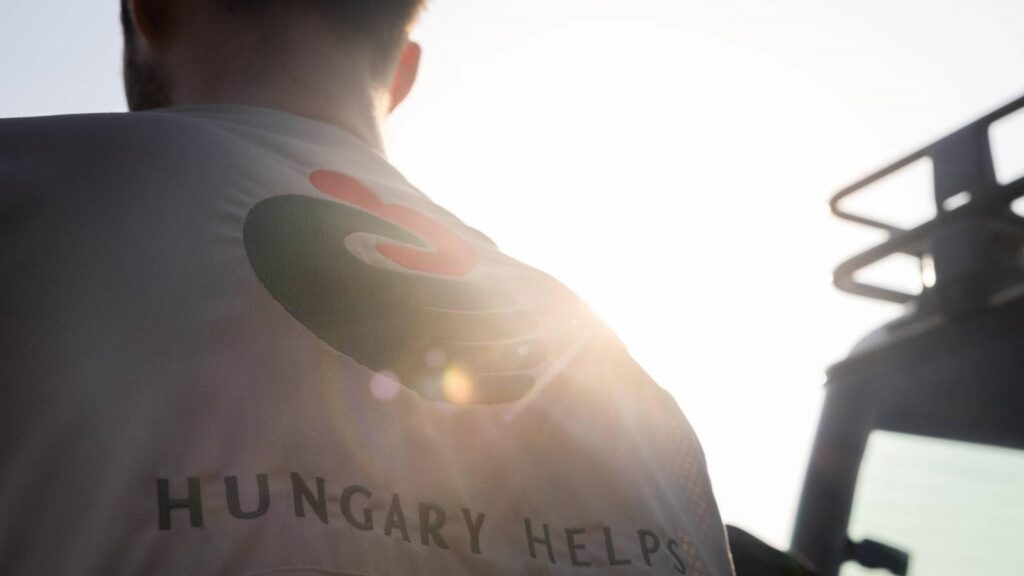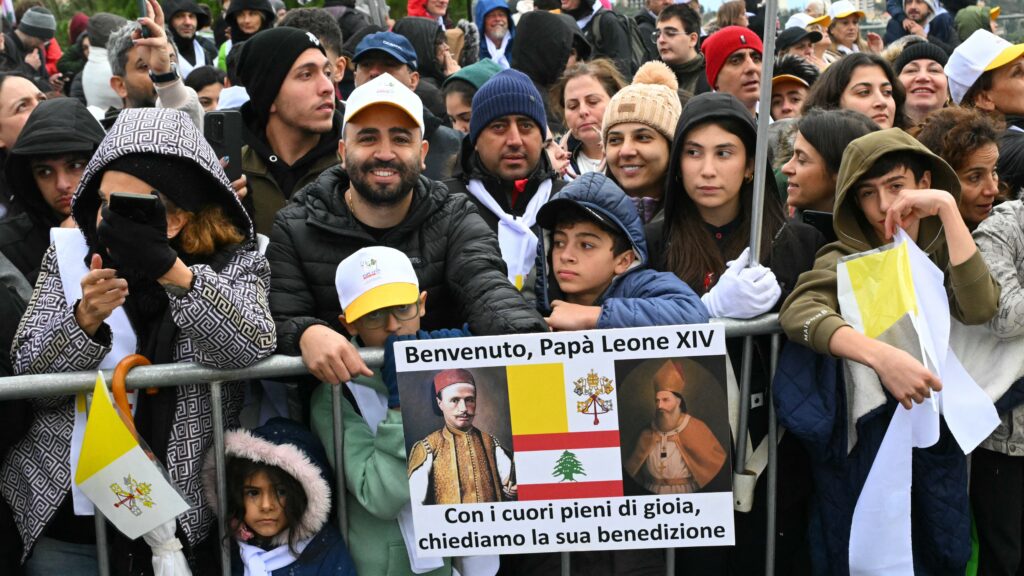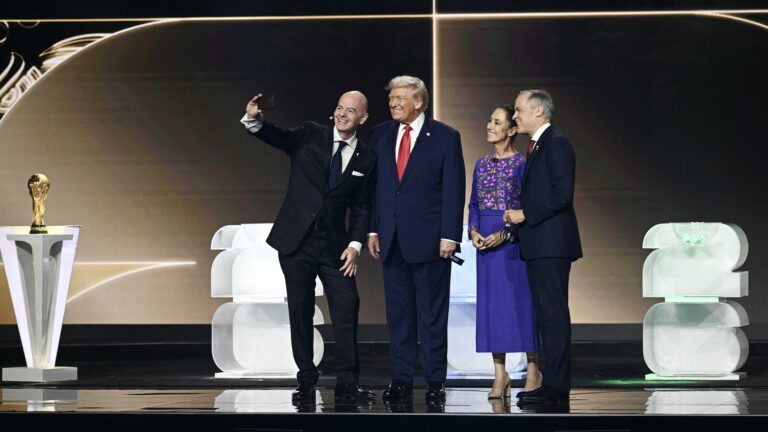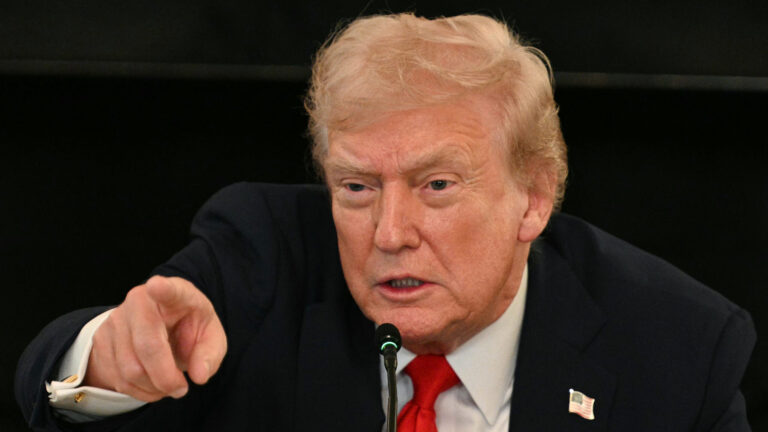For the second discussion organised by Hungarian Conservative, we invited Christian Democrat MEP György Hölvényi to talk about the role of conservative politics in the fight for religious freedom and morality in public discourse as well as for a better future for the world’s persecuted Christians. A Christian by heart and politician by necessity, Hölvényi’s personal engagement is a compass for those lost in the culture of indifference of European institutions.
The basement of Scruton Café was mostly filled by the time Hölvényi arrived. He did not take the stage immediately, instead took the time to shake the hands of a couple of people left and right, to share some words and quick smiles with the whole room. Then he sat down and let the audience know that this was an informal discussion where anyone could just get up at any moment to grab food or refreshments. His tone and presence instantly created a familiar atmosphere, something that only experienced and naturally charismatic politicians such as him are able to do.
A history and literature teacher by profession, Hölvényi was one of the founders of the Christian Democratic People’s Party in Hungary. He served as a state secretary under the second Fidesz-KDNP government between 2012 and 2014, before being elected to the European Parliament in 2014, where he has worked ever since. He spent the better part of the last decade trying to help persecuted Christian communities around the world, using both his position as MEP and working closely with Hungary Helps, a government programme and agency initiated by Hölvényi and others for exactly that purpose.
Zsófia Tóth-Bíró, the online editor of Hungarian Conservative and the host of the event began the discussion by citing dark statistics:
according to Open Doors, some 360 million Christians live in countries where they face significant danger for expressing their faith.
But despite that, Western supranational organisations—and the European Union in particular—appear to be largely indifferent to the issue. When asked what the reason for that might be, as a former teacher, Hölvényi started with a bit of history to help us all understand.
Indifference Is Not a Bug but a Feature
Every state has its own tradition of dealing with churches and religion. These political traditions differ greatly even in Europe, Hölvényi reminded. The challenge is that the EU itself doesn’t have any church policy of its own. Even though it was created in the spirit of old school Christian democracy (‘The EU founders were Christians first and Christian democrats second’, Hölvényi noted), on the institutional level it inherited the most secular frameworks from France and Belgium.
‘Belgium is the pronounced capital of secularism and even if that’s not bad in itself, it has consequences.’
The consequence is that it feels compelled to avoid everything that’s related to religiosity. In fact, the EU mostly refuses to address Christian persecution altogether, even though that’s not a religious but a human rights issue. To accommodate the non-religious, the EU is actively restricting believers on all levels of decision-making to the point when you can’t even bring up religion in a plenary meeting. ‘If I can’t talk about my own faith openly then I can’t call that religious freedom,’ Hölvényi said.
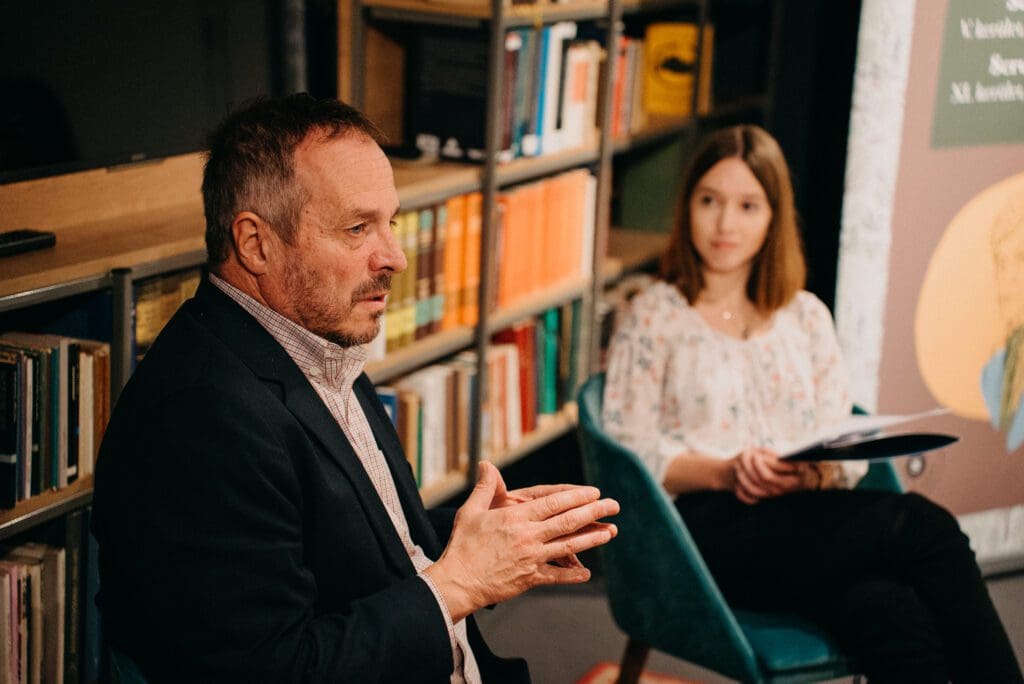
It would be wrong to claim that religious freedom is non-existent in Europe. Nonetheless, religious freedom is a spectrum, and it is being gradually restricted, especially in the top institutions, the MEP underscored. One of the problems surrounding the issue is that we’re so used to not talking about faith to the point where it feels unnatural to do so. Hölvényi shared a little anecdote to underline his point here. At one time he was part of an EU delegation to Chad, meeting with the president of the N’Djamena parliament. As customary there, the meeting began with a minute of prayer. Needless to say, many in the European delegation—especially the Greens and the Socialists—were taken aback by the gesture and felt uneasy throughout. ‘If I was to do that here, in Europe, I would get reported to the ethical committee. They can have prayer in an African parliament, we in Europe cannot.’
Europeans regard religiosity as a strictly personal issue, Hölvényi noted. ‘But that is an incredibly primitive take.’
Every minor detail of Europeans’ lives is being discussed in Brussels, except faith.
Hölvényi called this an ‘ontological absurdity’, given spirituality’s central place in human consciousness. Eastern Europeans can at least blame communism for this, but Western nations let religion be banished from public life on their own accord. Regardless, we’re in the same boat now, and it is everyone’s personal responsibility to do the best they can to make religion a public issue once again—for the sake of us, Europeans and hundreds of millions of Christians worldwide.
Fighting Against the Odds
When ISIS captured the Nineveh Plains in Northern Iraq—the historical home of Assyrian and Chaldean Christianity—the European Union simply had no means of immediate assistance. It lacked a policy framework, charity infrastructure and the basic know-how of helping persecuted Christians after trying to avoid the topic for so long. Not that anyone was really rushing to help. Except Hölvényi, who travelled to Erbil a few months after the occupation by ISIS to see the refugee camps and to hear the horrifying stories of rape, torture and death suffered at the hands of ISIS militants simply for belonging to Christ. Raising awareness back home wasn’t easy, however. Western Europeans continued to be indifferent, while Hungarians—even though more prone to solidarity—knew too little about Iraq to get involved at first.
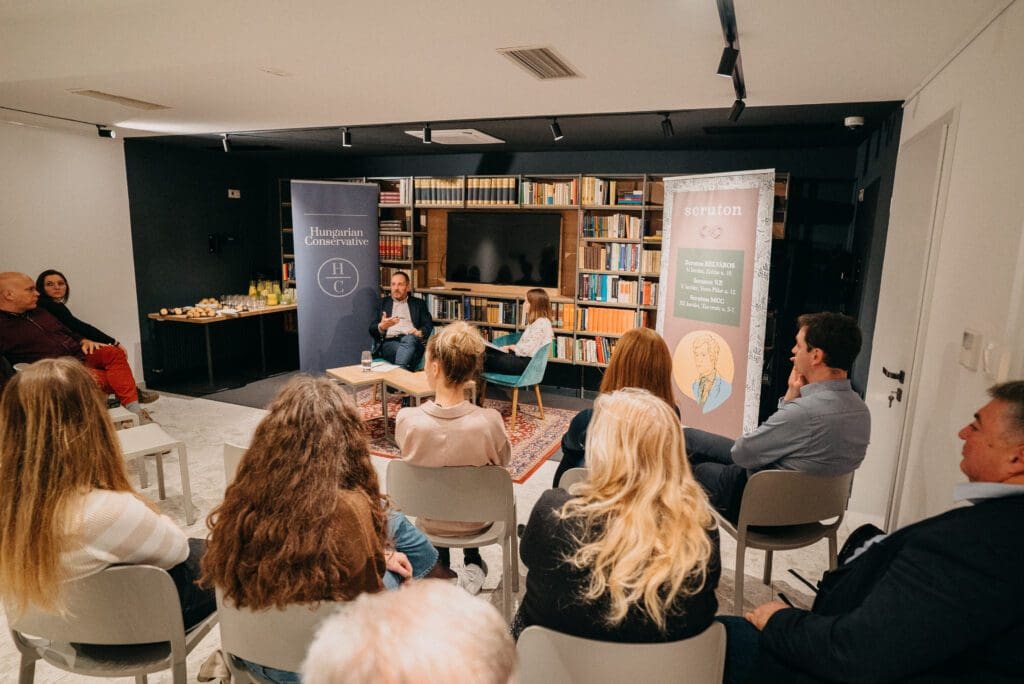
Only when news came that ISIS was destroying the artefacts of the Mosul Museum did the ice break in Brussels. ‘Built heritage is more important than people, it seems,’ Hölvényi added sarcastically. In Hungary, it was the refugee crisis that brought the situation in Iraq home. Christian solidarity based on a sense of cultural kinship was always present in Hungary, noted Hölvényi, and once enough people knew about what was happening, the donations started pouring in through the churches, while the government engaged in creating Hungary Helps to make sure the aid reaches its destinations.
Few know about Hungary Helps in Europe, although no government agency has done so much in Iraq and Syria to help restore life after ISIS as it did. Working closely with local churches and NGOs,
Hungary Helps restored schools, hospitals, churches and entire villages—for Christian and Muslim believers alike.
In return, as Tóth-Bíró pointed out, the Hungarian government is often accused of being hypocritical in its handling of the European refugee crisis and rejecting mass immigration. According to Hölvényi, this leftist trope has little merit. The rationale behind the Hungarian government’s ‘helping on the spot’ policy was clear from the start. Through assisting Christian communities, the government of Hungary also recognised that there is additional homework in humanitarian aid both for itself and the EU. With the creation of agreements and partnerships on a broad scale beyond religious or other determinations, credibility was reinforced. In a way, it facilitated persisting in the middle of the field, Hölvényi explained.
The aid on the ground certainly reflected the attitude of the Hungarian people as well: a desire to preserve the unique national culture of a tiny European nation while at the same time doing everything they can to help persecuted Christians in their own homeland. Also, accepting migrants was a political necessity in Western Europe (where millions of people from those countries of origin had been even prior to 2015), but not in Hungary. If anything, it is Christian solidarity that can be considered a political expectation in Hungary, one that the government fulfils to this day. The communities in the MENA region and Sub-Saharan Africa are more than grateful; no nation wants the best and brightest of its citizens to leave for Europe en masse: it is helping them on the spot that these nations ask for.
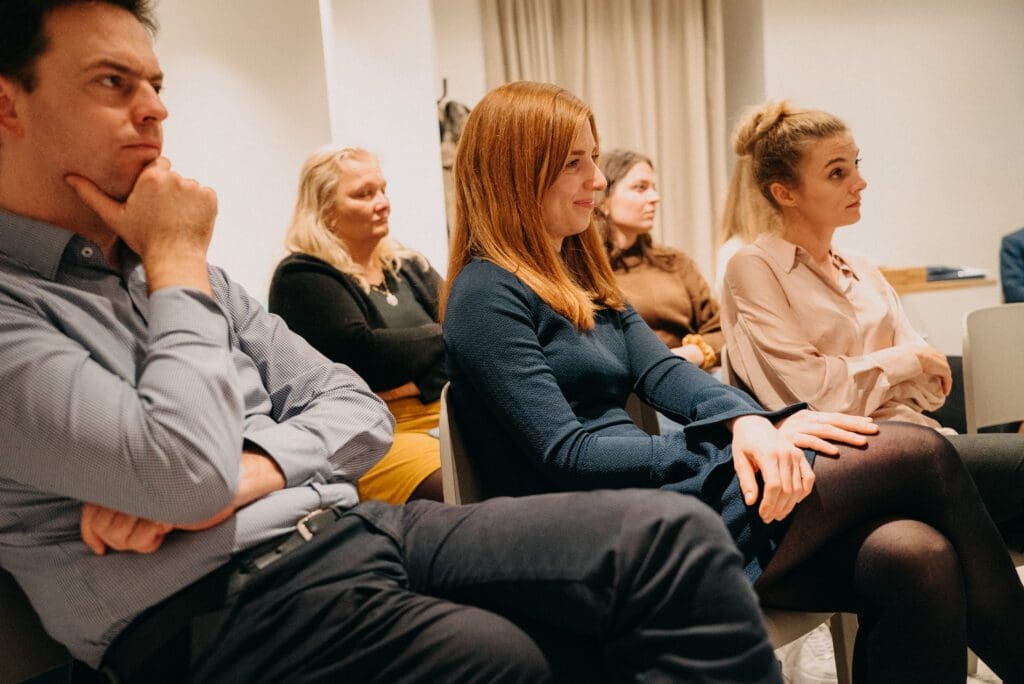
Of course, as Hölvényi also noted, Hungary is a nation of ten million people. Its options are limited when it comes to hundreds of millions in need every day. Nonetheless, that’s part of the magic of Hungary Helps. It works because it dares to do what others don’t: calling Christian persecution what it is. Once it stepped over the self-imposed limits of European sensibility, it could start looking for like-minded partners and assume responsibility well above its weight.
Christian persecution is a public issue, Hölvényi stressed, and should be addressed in a non-partisan way everywhere.
It’s not left or right, not even European, or Christian exclusively. Persecution has already prompted all faiths to engage in a dialogue, so it should bring all political parties together, too. The indifference must end, the MEP nailed down.
What the audience most certainly took away from Hölvényi’s remarks was that true belief in what is right can yield unbelievable results. But for someone like him, the job is never done. There will always be people in the world who suffer for their faith, but there will always be politicians, too, who fight the indifference and who extend a helping hand.

